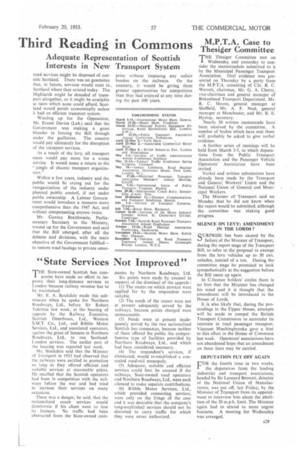Third Reading in Commons
Page 31

If you've noticed an error in this article please click here to report it so we can fix it.
Adequate Representation of Scottish Interests in New Transport System
road services might be disposed of outside Scotland. There was no guarantee that, in future, services would exist in. Scotland where they existed today. The Highlands might be denuded of transport altogether, or it might be available at rates which none could afford. Scotland would perish economically unless it had an efficient transport system.
Winding up for the Opposition, Mr. Ernest Davies (Lab.) said that the Government was making a great blunder in forcing the Bill through under the guillotine. The country would pay ultimately for the disruption of the transport services.
As a result of the levy, all transport users would pay more for a worse service. It would mean a return to the jungle of chaotic transport organization."
Within a few years, industry and the public would be crying out for the reorganization of the industry under planned public control, if not under public ownership. A Labour Government would introduce a measure more comprehensive than the 1947 Act, and without compensating anyone twice.
Mr. Gurney Braithwaite, Parliamentary Secretary to the Ministry, wound up for the Government and said that the Bill emerged, after all the debates and divisions, with the main objective of the Government fulfilled— to restore road haulage to private enter prise without imposing any unfair burden on the railways. On the contrary, it would be giving them greater opportunities for competition than they had enjoyed at any time during the past 100 years.




















































































